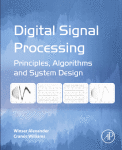

Most ebook files are in PDF format, so you can easily read them using various software such as Foxit Reader or directly on the Google Chrome browser.
Some ebook files are released by publishers in other formats such as .awz, .mobi, .epub, .fb2, etc. You may need to install specific software to read these formats on mobile/PC, such as Calibre.
Please read the tutorial at this link: https://ebookbell.com/faq
We offer FREE conversion to the popular formats you request; however, this may take some time. Therefore, right after payment, please email us, and we will try to provide the service as quickly as possible.
For some exceptional file formats or broken links (if any), please refrain from opening any disputes. Instead, email us first, and we will try to assist within a maximum of 6 hours.
EbookBell Team

0.0
0 reviewsDigital signal processing (DSP) has been applied to a very wide range of applications. This includes voice processing, image processing, digital communications, the transfer of data over the internet, image and data compression, etc. Engineers who develop DSP applications today, and in the future, will need to address many implementation issues including mapping algorithms to computational structures, computational efficiency, power dissipation, the effects of finite precision arithmetic, throughput and hardware implementation. It is not practical to cover all of these in a single text. However, this text emphasizes the practical implementation of DSP algorithms as well as the fundamental theories and analytical procedures that form the basis for modern DSP applications.
Digital Signal Processing: Principles, Algorithms and System Designprovides an introduction to the principals of digital signal processing along with a balanced analytical and practical treatment of algorithms and applications for digital signal processing. It is intended to serve as a suitable text for a one semester junior or senior level undergraduate course. It is also intended for use in a following one semester first-year graduate level course in digital signal processing. It may also be used as a reference by professionals involved in the design of embedded computer systems, application specific integrated circuits or special purpose computer systems for digital signal processing, multimedia, communications, or image processing.